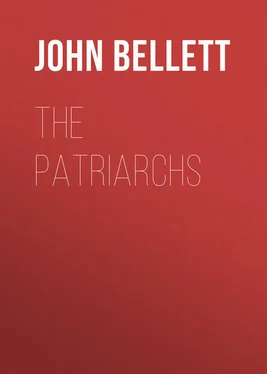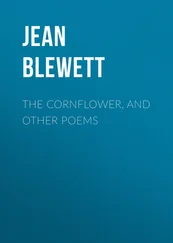John Bellett - The Patriarchs
Здесь есть возможность читать онлайн «John Bellett - The Patriarchs» — ознакомительный отрывок электронной книги совершенно бесплатно, а после прочтения отрывка купить полную версию. В некоторых случаях можно слушать аудио, скачать через торрент в формате fb2 и присутствует краткое содержание. Жанр: foreign_antique, foreign_prose, Биографии и Мемуары, на английском языке. Описание произведения, (предисловие) а так же отзывы посетителей доступны на портале библиотеки ЛибКат.
- Название:The Patriarchs
- Автор:
- Жанр:
- Год:неизвестен
- ISBN:нет данных
- Рейтинг книги:4 / 5. Голосов: 1
-
Избранное:Добавить в избранное
- Отзывы:
-
Ваша оценка:
- 80
- 1
- 2
- 3
- 4
- 5
The Patriarchs: краткое содержание, описание и аннотация
Предлагаем к чтению аннотацию, описание, краткое содержание или предисловие (зависит от того, что написал сам автор книги «The Patriarchs»). Если вы не нашли необходимую информацию о книге — напишите в комментариях, мы постараемся отыскать её.
The Patriarchs — читать онлайн ознакомительный отрывок
Ниже представлен текст книги, разбитый по страницам. Система сохранения места последней прочитанной страницы, позволяет с удобством читать онлайн бесплатно книгу «The Patriarchs», без необходимости каждый раз заново искать на чём Вы остановились. Поставьте закладку, и сможете в любой момент перейти на страницу, на которой закончили чтение.
Интервал:
Закладка:
These operations of the Spirit through the promise on the souls of sinners are truly beautiful. The apron of fig-leaves drops off, or is rather cast away, when such operations go on. It is found unnecessary now, as it was found insufficient before. And so all the inventions of men. They are the contrivances of the wrong-doer himself, the efforts of the creature, the devices of the sinner, and they can therefore never do. But they are as unnecessary as they are insufficient. The coat of skin, the work of God Himself, has made them so.
There is, however, something which this glorious relief provided for the sinner does not accomplish. The thorns and the thistles of the cursed ground remain; and with them the sweat of the face, and the sorrow of the heart, and then the return of dust to dust. As to this hour. We shine in "the righteousness of God," adorned under His own eye, and by His own hand dressed for His presence; but all the while pressures and hindrances and sore grievances wait on the tilling of the earth; and pains bring us into the world, till we return to the dust from whence we came. Neither does this glorious provision of grace displace the cherubim. They accompany it rather. They are stationed at the eastern gate of the garden, with their flaming sword, to keep every way of the tree of life; and no promise which Adam had listened to, no covering which Adam had received, changes this. Man's capacity to regain that tree is gone, and gone for ever. Never will he be anything but a saved sinner , pass he along what paths of glory he may, from "paradise" to "the kingdom," from the kingdom to "the new heavens and the new earth." Eating of that tree is only by gift of Jesus, the woman's Seed of the first promise. Rev. ii. 7.
Such are among the mysteries taught us in this wonderful chapter, full of mysteries as it is, and of the profoundest secrets of God. But we have to come down for instruction to learn man and his ways, as well as to rise, as we learn God and His counsels.
Cain is declared by the Spirit of God in the apostle to have been "of that wicked one." The first thing we see in him is his religion. He renders to God, as offering or sacrifice, the fruit of the cursed ground, the produce of his own toil. But this was unbelief. It was the denial of all that had happened since the creation, the religious denial of it. It was the direct contradiction of the way of faith, or of Abel. Abel took the way of the promise to God, the bloody victory of the woman's Seed, the death and resurrection of Christ, and offered of his flock; but Cain refused to see man's ruin and God's redemption, giving God the fruit of the earth; in effect saying, that He was to be read and known in the thorns and the thistles, the sweat, and the sorrow, and the death; and by the solemn services of his altar he was denying all truth.
This was the way of a heart deeply departed from God. He was laying the scene of ruin at God's door, as Adam, ere he repented, had laid down the sin itself there.
His next way is in terrible keeping with all this. He hates his brother, being of that wicked one who is a murderer (John viii. 44), and in process of time he slays him.
Tremendous fruit of the apostate, departed nature. He was the first of that generation who delivered Jesus to be crucified-self-righteous and murderous. For envy the Jews delivered Jesus; and Cain slew Abel because his own works were evil and his brother's righteous. It is the world. "Marvel not, my brethren, if the world hate you. We know that we have passed from death unto life, because we love the brethren. He that loveth not his brother abideth in death. Whosoever hateth his brother is a murderer, and ye know that no murderer hath eternal life abiding in him." The Lord pleaded with him. See iv. 6, 7. His heart had conceived the sin, but his hand had not brought forth fruit unto death; and with a voice of long-suffering grace and warning the Lord pleaded with him. The grace was despised; this grace of pleading with him at the last hour, as the grace of the promise had been despised before.
"This is the condemnation, that light is come into the world, and men loved darkness rather than light, because their deeds were evil." The light which the Lord Jesus was bringing with Him was the light of life or salvation. Isa. xlix. 6; John viii. 12. And this was the light which Cain hated and refused.
There is the light of righteousness or holiness. But the refusal of it is not without remedy. In that light the Lord God had come into the garden and called, "Adam, where art thou?" Adam could not stand it; for he had sinned. It was intolerable to him. He had come short of that glory. He retreats from it. And then the Lord God shines in another light. The promise is made. The character of the glory is changed. God seats Himself in a light which the sinner can approach, and, believing, Adam comes forth.
This was the light which Cain despised, the light of salvation, the light of the promise, the light in which God shines before men outside the garden. And Cain is therefore cursed as Adam had not been. As it is said of another generation, "Behold, ye despisers, and wonder, and perish."
All this is the solemn history of the first unbeliever. But the treasury of corrupt nature that was in him spends itself in further ways of wickedness. In him was rising that spring which was to give out "its superfluity of naughtiness." He lies after all this, and justifies himself. "I know not," says he; "am I my brother's keeper?" For "the lusts of his father he would do;" and when the devil "speaketh a lie, he speaketh of his own: for he is a liar, and the father of it."
All this, however, and even more than this, was man , and not Cain merely. It was the ruined heart of man exposing itself. And because it was this, because it was the common nature that was thus disclosing itself, the Lord takes the judgment of it away from man. "Whosoever slayeth Cain, vengeance shall be taken on him sevenfold;" for none are without sin. "Thou art inexcusable, O man, whosoever thou art that judgest; for wherein thou judgest another, thou condemnest thyself." All are in the like condemnation. No one can take up the stone and cast it at another. And in order to express this great principle of truth, and that God alone has either title or competency to deal with sin, the Lord will not allow any man to touch the fratricide. By this divine writing on the case, all are to go out convicted, one by one, and leave the sinner with God. John viii.
For the ends of government, when government in the earth becomes the divine purpose, it shall be said, Whoso sheddeth man's blood, by man shall his blood be shed. ix. 6. But this is not so as yet. And for the teaching of the common pravity, that all of us may be humbled by the common conviction, that "we have all sinned, and come short of the glory of God," not one of the whole human family is allowed to touch this wicked Cain. And so to this day, when government has been divinely set up, it is not sin that it deals with. Crimes , or offences against public order, and wrongs done to individuals, may be judged by man; but to take vengeance on sin would be the assuming of personal guiltlessness. "He that is without sin among you, let him first cast a stone at her." God has to deal with sin alone . 2 2 Some have spoken of the Jews, as guilty of the blood of Christ, so as to have betrayed the principle of self-righteousness condemned here. And yet I doubt not that there is a sense in which the Jews are-in a special sense-connected with that sin in the divine judgment. The land of the Jews is the distinguished field of blood; the blood of Jesus, in a great sense, is specially on them and their children. And so, like Cain, that people are under the special securities of God. And further; that blood is to be cleansed from off their land, though it now so stains it. Joel iii. 21. And still further; the language of Lamech, I also judge, is mystical or typical, intimating the repentance of the Jews who shed the blood, after generations of unbelief and hardness of heart. See note, p. 20.
Интервал:
Закладка:
Похожие книги на «The Patriarchs»
Представляем Вашему вниманию похожие книги на «The Patriarchs» списком для выбора. Мы отобрали схожую по названию и смыслу литературу в надежде предоставить читателям больше вариантов отыскать новые, интересные, ещё непрочитанные произведения.
Обсуждение, отзывы о книге «The Patriarchs» и просто собственные мнения читателей. Оставьте ваши комментарии, напишите, что Вы думаете о произведении, его смысле или главных героях. Укажите что конкретно понравилось, а что нет, и почему Вы так считаете.












